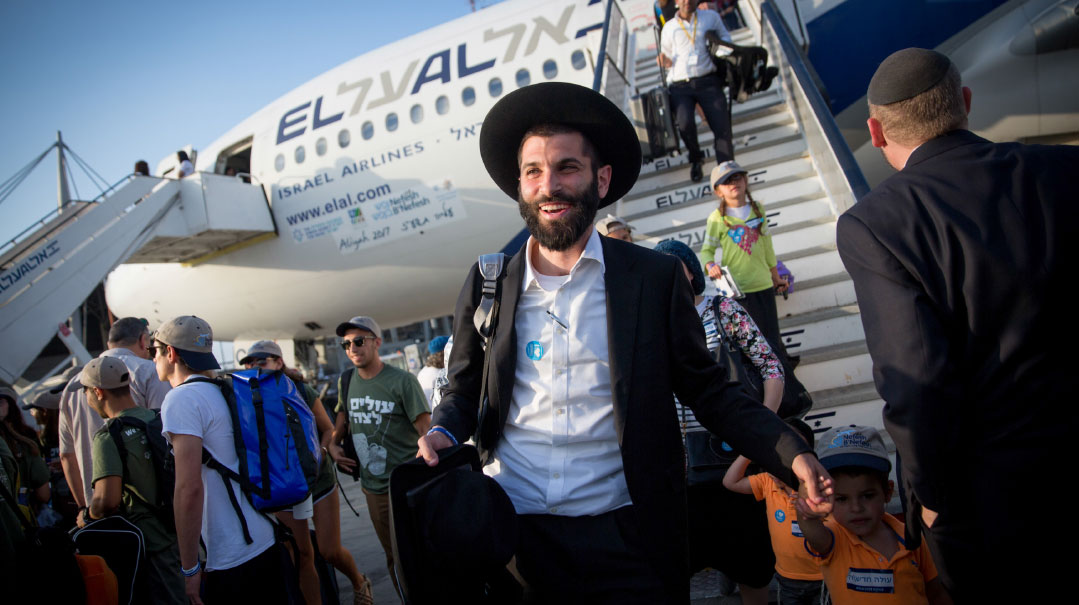Road Map For Aliyah

No matter what the government can or can’t do, immigrants need their own game plan

As I write this column today, the Rose family has reached a milestone: the 27th anniversary of our aliyah.
It’s been a huge brachah. Our sons live here. We’ve merited to see two additional generations born here. I sometimes quip that it took 17 years for our net worth to surpass the figure we came with. Yet we’ve never missed a meal, except on fast days, and we have always lived comfortably due to the many offsetting factors that make financial life in Israel easier, despite the lower salaries and paucity of single-family homes in religious neighborhoods.
The first bill for our son’s kindergarten tuition at a Chinuch Atzmai cheder was NIS 300 ($100 at the time) for the entire year, with a 10% discount if we paid by Cheshvan. Health insurance came with the territory via a painless payroll deduction on a job I found after just a couple of months of searching.
I could ramble on, but I’m a newsman. My assignment here is to relate to the projection from Israel’s new immigration minister of 85,000 new olim in the next year — including a tidal wave from America — as more Jews start viewing Israel as a safer haven from pestilence, civil unrest, and anti-Semitism.
The projected inflow of immigrants sounds like a statistic on steroids. Israel is also battling the coronavirus and dealing with its economic fallout, throttled by a government riddled with dissension and backstabbing. Who’s coming here with travel bans in effect? Where will new immigrants live in a country with a chronic housing shortage? How can a pandemic-decimated economy generate new jobs when a million Israelis are still out of work?
Yet we’ve been here before. Israel has always faced major security threats and economic disorders with shaky governments at the helm. Some 3.3 million of Israel’s seven million Jews are immigrants. Based on figures from the World Zionist Organization, Israel has absorbed more than, or close to, 85,000 new immigrants in a year a dozen times since 1948. Much of that came during the early years of statehood or in the big waves of aliyah from Ethiopia and the former Soviet Union, when the state had far fewer resources at its disposal than today.
A Better Question
It’s easier to attract immigrants who don’t have a better option. What will it take to entice well-heeled Americans and other Westerners to make aliyah?
Almost ten years ago, Mishpacha devoted the bulk of Issue #343 to aliyah. It was a bold decision, for which we received mostly positive feedback, while raising some eyebrows.
Arutz Sheva, which primarily serves the national-religious audience and has always been very pro-aliyah, invited me on one of their talk shows for an interview. They threw me one “trick question.” Was the Mishpacha article a sign that the gedolim in America were ready to give their full-throated support to aliyah?
In an interview, almost any question is fair. It’s also fair game to dveflect a question and answer it with a prepared talking point.
The State of Israel, I responded, did a praiseworthy job absorbing millions of persecuted or poverty-stricken Jews. If you want to know when Americans will come, I told my interlocutors, ask the government first: When will they initiate a parallel effort to free up land, build single-family homes for the upscale, streamline bureaucracy to enable accomplished individuals to practice and prosper in their professions, and develop educational streams suited to the needs of olim, specifically the chareidim?
There has been progress on all of these fronts, especially in the last decade. There is a much wider range of choices when it comes to suitable neighborhoods for Americans, job opportunities — especially in high-tech, accounting, and allied medical fields — and school choice compared to when we arrived in 1993. But I mentioned these three areas because that’s what we were advised to come to terms with before making our decision.
People still ask why we felt confident enough to make the leap. To make a long story short,while I already wrote that today is our 27th aliyah anniversary, it is also my mother’s 29th yahrtzeit.
Halfway through my aveilus, I felt compelled to say Kaddish for my mother at the Kosel at least once, so my wife and I and our youngest son took off for a three-week visit to Israel. It was glorious. The atmosphere was completely different. Life revolved around the Jewish calendar in a land where our forefathers are eternal role models (not statues to be desecrated and toppled at somebody’s whim).
The day after we returned home, we sent our oldest son off to a yeshivah we found for him in Israel. That gave us incentive to follow suit.
As the weeks passed, my wife and I would relax on our front porch every evening when I came home from work and relive our trip. One day, we looked at each other and said the same exact words to each other at the same time.
“What are we doing here”?
We were members of Congregation Ohr Chaim in Miami Beach. Rabbi Avrohom Chaim Feuer was our rav and our daas Torah. He heard us out. He advised that before we could get his blessing, we needed to answer three questions: Where we would live (putting ourselves at the mercy of the state in an absorption center was out of the question, he said); where would our youngest son learn; and where would I work?
We made a pilot trip a few months later and settled on Rabbi David Stein’s community in Rehovot. Rabbi Stein even took the initiative to reserve a space in yeshivah for our son in case we arrived after the registration deadline. With two out of three questions settled, I gave my progress report to Rabbi Feuer. I also told him I had a couple of job interviews but discovered that no one would hire me until I had actually moved to Israel. I still remember Rabbi Feuer’s memorable retort: “G-d likes you. He’ll find you a job.” He gave us his blessing.
The next 27 years could fill a book, but throughout the entire resettlement process, we came to view the Israeli government not as a hindrance but as the primary resource and facilitator of all of our rights and benefits.
If 85,000 or even 185,000 immigrants come knocking down the doors next year, the government will scramble to meet their needs as in any other national emergency. It will have successes and failures. No matter what the government can or can’t do, immigrants need their own game plan.
That includes davening for inspiration and success. There will always be unexpected twists and turns in the road. Hashem knows what we need better than we do and better than the state ever will.
(Originally featured in Mishpacha, Issue 818)
Oops! We could not locate your form.













